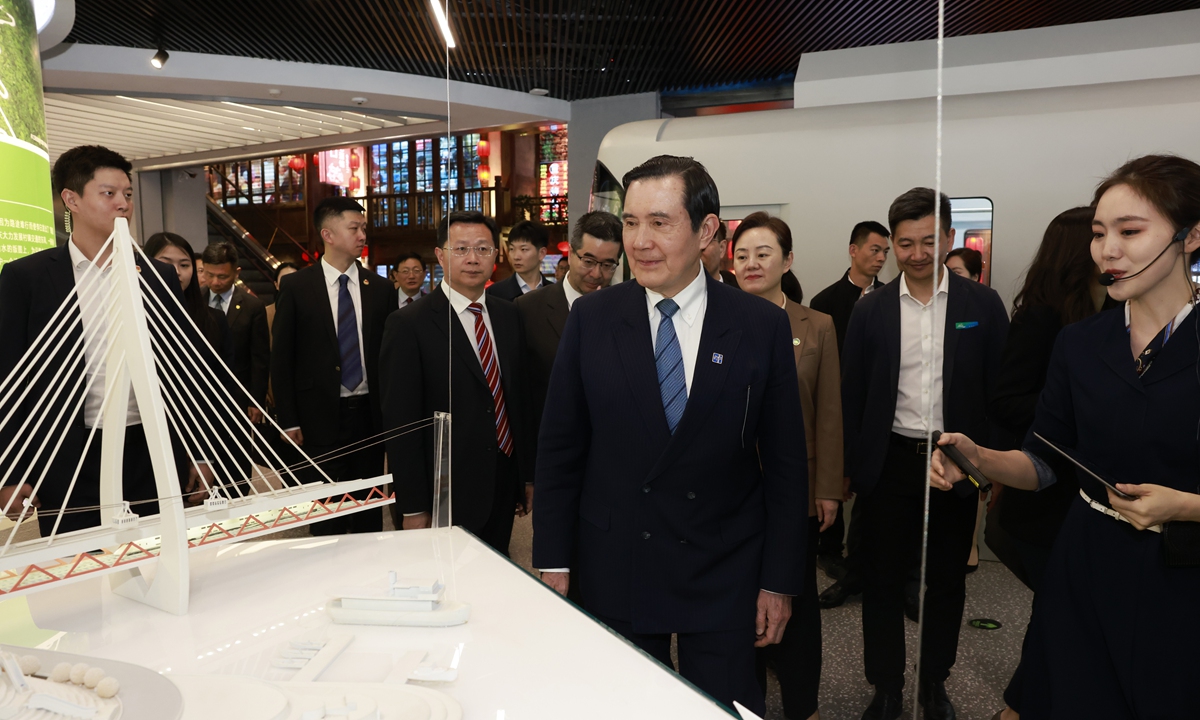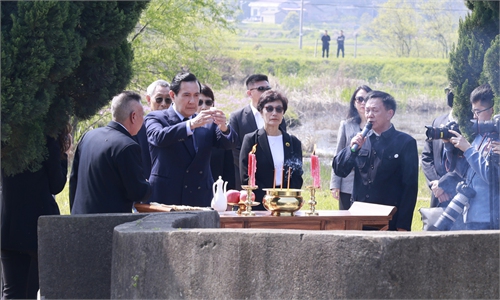Ma Ying-jeou expresses high expectations for cross-Straits exchanges while meeting with mainland officials in Chongqing

Former chairperson of the Chinese Kuomintang (KMT) party Ma Ying-jeou visits the Chongqing Urban Planning Exhibition Hall in Southwest China's Chongqing Municipality on April 3, 2023. Photo: VCG
Former chairperson of the Chinese Kuomintang (KMT) party Ma Ying-jeou on Monday expressed high expectations for exchanges and cooperation between Taiwan island and Chongqing Municipality while meeting with mainland officials, as his 12-day ancestral trip in the Chinese mainland entered its fourth major city.
During the meeting with Yuan Jiajun, secretary of the Chongqing Municipal Committee of the Communist Party of China (CPC), Ma said that the modernization of Chongqing is an important factor for attracting Taiwan businesspeople and enterprises to settle down for development and investment and for cross-Straits exchanges.
In the future, Taiwan and Chongqing will have more possibilities for deepening cooperation in new energy, electronic information industry and other fields, Ma said.
Ma left Changsha, Hunan Province and flew to Chongqing on Monday morning. He visited the Chongqing Urban Planning Exhibition Hall and the Three Gorges Museum before meeting with Yuan in the evening. Ma said the visit to the exhibition hall was "quite impressive," as his experience as mayor of Taipei taught him how difficult it is to govern a city.
Yuan expressed a warm welcome to Ma's visit on behalf of the 34 million Chongqing residents. He said it was a great pleasure to meet Ma and his delegation in Chongqing in the warm spring and blooming season, "especially, in an important city that witnessed cooperation between the KMT and the CPC [against Japanese invaders], as well as the intensive economic, trade, cultural and people-to-people exchanges between the mainland and Taiwan."
Yuan told Ma that he was touched by Ma's repeated emphasis on adhering to the 1992 Consensus, opposing "Taiwan independence," and promoting cross-Straits exchanges and cooperation for win-win development, which is completely consistent with Ma's long-term experience of promoting cross-Straits opening, exchanges, cooperation and development.
Ma said Chongqing meant a lot to him as his parents had completed their university education there during the War of Resistance against Japanese Aggression (1931-45). Tales of heroism against invaders had been the subject of his bedside stories since childhood, according to Ma.
Ma said he will visit a local museum themed on the war against Japanese invaders on Tuesday with Taiwan students, as "it's an important site and a shared memory in our Chinese history, and I believe it's also an important process of reconnecting the two sides of the Straits for young people."
Yuan said he noted that Ma's delegation was made up of college students, master's students and doctoral students, emphasizing that "they are the hope of the future development of our country."
Ma told Yuan that the exchange activities in Wuhan and Changsha between students from both sides of the Taiwan Straits have been successful, and both sides have the responsibility of keeping such exchanges going and even expanding them into trade, culture and society. "I have very high expectations for the future."
During Ma's eight years as Taiwan's regional leader (2008-2016), the two sides held 11 high-level talks and signed 23 agreements in fields ranging from economy and tourism to flights, including the Economic Cooperation Framework Agreement (ECFA), the most significant free trade agreement signed by both sides of Taiwan Straits in Chongqing in 2010.
Zhang Wensheng, deputy dean of the Taiwan Research Institute at Xiamen University, told the Global Times on Monday that Chongqing, as the provisional wartime capital of the Nationalist government, was home to many KMT memories. In addition, Chongqing, whose economy has been growing steadily in recent years, has become a popular destination for Taiwan investment, as labor and land costs have risen in the mainland's eastern cities.
After Ma's visit, young people and businesspeople from Taiwan will pay more attention to Chongqing, and consider it as an option for their work, study and life in the mainland, Zhang said.
There is a close historical connection between Chongqing and Taiwan, and the economic, social and cultural cooperation between the two regions has reached a new stage, said Zhang, noting that Chongqing is playing an increasingly important role in cross-Straits relations.


